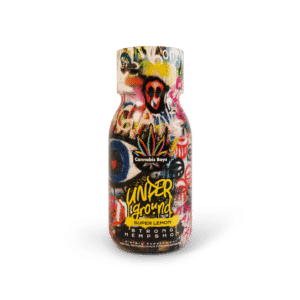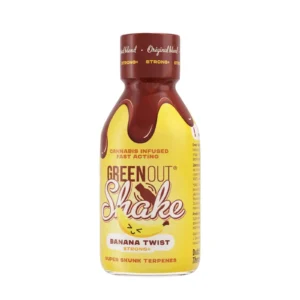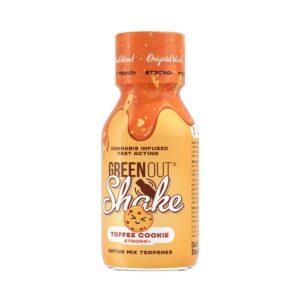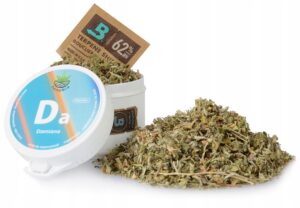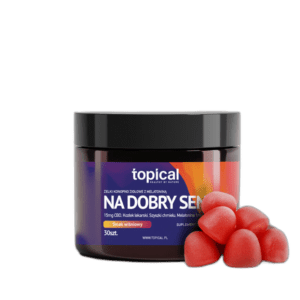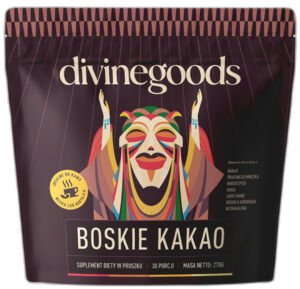- Studies suggest that THC can temporarily lower testosterone levels after acute use, but chronic use does not appear to have a significant clinical impact.
- Some studies indicate higher testosterone levels in recent marijuana users, which is controversial.
- The evidence is mixed, and a systematic review found no clinically significant link between THC and testosterone levels.
Tetrahydrocannabinol (THC), the main psychoactive ingredient in marijuana, is the subject of numerous studies due to its potential effects on health, including levels of testosterone - a key hormone for men, responsible for reproductive health, muscle mass and libido. Does THC lower testosterone levels? The answer is not straightforward, as studies are yielding conflicting results, and the topic is much debated. In this article, we'll take a look at the available evidence, considering both the potential reduction and lack of impact, and make recommendations for those interested in the question.
What does the science say?
Research on the effects of THC on testosterone levels is complex and often depends on marijuana use (acute vs. chronic), dose and individual differences. Here's what to know:
- Acute use and temporary decline: Some studies, such as an analysis of data from the 1980s, indicate that after smoking a single joint or intravenous administration of THC, testosterone levels can temporarily drop, returning to normal after at least 24 hours.
- Chronic use and lack of clinical impact: Systematic review of 2021 published in Andrology found no clinically significant association between cannabis use and testosterone levels, suggesting that long-term use may not have a significant effect.
- Unexpected discovery - higher levels in recent users: Some studies, including those based on NHANES data, have shown that men who had recently used marijuana had slightly higher testosterone levels, especially among younger men.
Why are the results contradictory?
The differences in performance may be due to several factors:
- Dosage and frequency: Acute use can cause temporary changes, while chronic use can lead to adaptation of the body.
- Individual differences: Age, genetics, and general health can all affect the response to THC.
- Research Methodology: Differences in sample size, control groups and measurement techniques can lead to different conclusions.
For example, animal studies, such as those on primates, have shown that chronic THC use leads to reduced testicle size and lower testosterone levels, but these results do not always translate directly to humans
A detailed analysis of the research
THC interacts with the endocannabinoid system, which can affect the production of hormones, including testosterone. Testosterone is produced mainly by Leydig cells in the testes and regulated by pituitary hormones such as luteinizing hormone (LH). Increasing marijuana use, especially among young men, has prompted researchers to investigate whether THC can lower testosterone levels. An analysis of available studies shows that the results are inconclusive, requiring a deeper look at various aspects, such as acute vs. chronic use, dose and even interspecies differences.
Studies suggesting a drop in testosterone levels
Some studies, particularly older ones or animal studies, point to the potential negative effects of THC on testosterone levels:
- A study from Oregon Health & Science University (2022) on primates showed that daily administration of THC for 7 months led to a reduction in testicular size of more than 50% and a significant decrease in testosterone levels, with a dose-dependent effect.
- A re-analysis of data from the 1980s showed that testosterone levels are reduced both after smoking a single joint and after intravenous THC administration, with a recovery time of at least 24 hours.
- A study of more than 2,000 infertile men found that marijuana users had lower plasma testosterone levels compared to non-users, although sperm concentration and motility were not affected.
Key research suggesting a decline in testosterone levels:
| Study | Study group | Key finding | Comments |
|---|---|---|---|
| OHSU, 2022 | Primates (monkeys) | >50% reduction in testicular size, lower testosterone | Chronic use, dose dependence |
| ScienceDirect, reanalysis | Men, existing data | Lowering of testosterone after acute use, return after 24h | Simulation analysis, no new clinical data |
| Hims, infertility study | >2000 infertile men | Lower testosterone levels in marijuana users | No effect on sperm concentration and motility |
Studies suggesting no effect or an increase
Other studies, especially newer ones and on larger groups, show no significant effect or even an increase in testosterone levels:
- A study based on NHANES (2011-2012) data from 1,577 men found no difference in testosterone levels between users and non-users, but recent users had slightly higher levels, especially in the 18-29 age group.
- A study from the World Journal of Urology (2020) found that men who had used marijuana in the past year had higher testosterone levels, especially with use at least two or three times a month.
- An ex vivo study on adult testicular tissue showed that a 48-hour or 9-day exposure to THC and CBD had no effect on testosterone production.
Key studies suggesting no impact or growth:
| Study | Study group | Key finding | Comments |
|---|---|---|---|
| NHANES 2011-2012 | 1577 men | Higher testosterone levels in recent users | Especially in the 18-29 age group, no overall difference |
| World Journal of Urology 2020 | Men, marijuana users | Higher testosterone levels with frequent use in a year | Adjusted for age, BMI, smoking, etc. |
| WJMHO, ex vivo study | Human testicular tissue | No effect on testosterone production after 48h/9d | Ex vivo test, does not reflect full physiology |
Systematic review and meta-analysis
A 2021 systematic review and meta-analysis (Belladelli et al.) analyzed 9 studies from 4787 men, 1,717 of whom were cannabis users. The results showed that the difference in testosterone levels between users and non-users was small (SMD = -0.139, 95% CI: -0.413; 0.134, P = 0.318), indicating no clinically significant effect. After excluding one study (Kolodny et al.), the SMD was 0.0999 (P = 0.006), suggesting a small increase, but the effect was very small.
Meta-analysis results:
| Aspect | Result |
|---|---|
| Number of tests | 9, 4787 men (1717 users). |
| Difference in testosterone levels (SMD) | -0.139 (95% CI: -0.413; 0.134, P = 0.318) |
| Heterogeneity | High (I² = 87.22%). |
| After excluding Kolodny et al. | SMD = 0.0999 (P = 0.006), I² = 13.20% |
| Application | No clinically significant effect |
Possible reasons for discrepancies
Differences in performance can result from:
- Frequencies and dosages: Acute use can cause a temporary decline, while chronic use can lead to adaptation.
- Interspecies differences: Studies on animals, such as primates, show greater negative effects that do not always translate to humans.
- Methodology: Differences in sample size, control groups and measurement techniques can affect the results.
For example, a study in primates showed a dose-dependent decrease in testosterone with chronic use, but this was at doses equivalent to heavy medical marijuana use in humans, which may not reflect typical use patterns.
Conclusions and recommendations
Current knowledge indicates that the effects of THC on testosterone levels are complex and inconclusive. Acute use may temporarily lower testosterone levels, but chronic use does not appear to have a significant clinical impact, with some studies even suggesting higher levels in recent users. A systematic review suggests that any effect is not clinically significant.
For marijuana users, especially those planning to have offspring or concerned about reproductive health, it's worth consulting a doctor, especially with long-term use. Monitoring hormone levels can help assess individual impact.
Final thoughts
The relationship between THC and testosterone requires further research, especially on large groups of people, to better understand the long-term effects. With the increasing prevalence of marijuana, ongoing research will be crucial for hormonal health.

